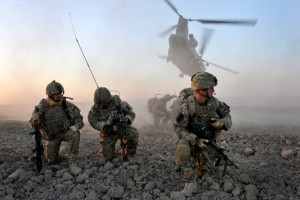By: Annette Brinckerhoff
At the beginning of his second term in office, George W. Bush vowed to protect and promote democracy at home and abroad following the turbulent events of his first term. He wasn’t the first president to make such a vow, and he will not be the last. However, as Bush took his second term in office and reaffirmed his commitment to democratic principles, he was knee deep in wars in Iraq and Afghanistan, silencing domestic activists, and fostering alliances with nations ideologically incompatible with democratic institutions.
The democratic peace theory argues that true, liberal, democracies won’t fight each other. Instead, because of social pressures, and the nature of their institutions, nations will resolve their problems through diplomatic manners. If we make the assumption that stable peace will promote human and economic development, then we can assert that peace is mutually beneficial for everyone. By making this assertion, one would think that the struggle would involve those protecting democracy and those who are hungry for power instead of a socially sustainable peace. In the long term attainment of this goal, policy should reflect a desire to strengthen democratic institutions at home or abroad. By ensuring that democratic ideals of representative governance and civil liberties are upheld, we begin to set an example to pave the way for a democratic peace.
Instead, what we have seen is a reccurring history of leaders undermining democratic institutions and values under the pretext of national security. The United States, the self-described champion of democracy, invaded Iraq with faulty evidence under fabricated pretenses. Domestically, the U.S. has been repressing freedom of speech through allowing an oligarchy to emerge where the dollar value attached to your last name makes your vote count more. At the same time civil rights protesters demonstrating peacefully for the most part are greeted with military-grade equipment meant to quell riots. Though this is not to say the United States is the only democracy to engage in hypocritical actions. In Canada, parliament is stifling the freedom of speech of activists boycotting Israel by framing it as an issue of hate speech. Abbott’s government in Australia is selling off the Great Barrier reef to oil companies, forfeiting the environmental sustainability and economic property it provides for fishermen and Australian citizens. In Argentina, the chief witness was murdered before a court case dealing with President Fernandez’s role in allegedy covering up a terrorist attack in connection to the Iranians ever reached the stand. Israel continues to commit human rights violations, with no repercussions, and blind support. On a global scale, a growing list of countries who’s intelligence organizations have been cooperating in the NSA’s indiscriminate collection of personal data from citizens around the world. These are only a few examples of how democracies themselves are undermining the roles and protections of the global democratic systems.
By supporting regimes that blatantly disregard individual protections and actively impose policies that contradict democratic ideas, we further erode at the future for a democratic peace. We continue our support and raise no qualms when four school children are arrested in Egypt for “insulting” Islam in a joke. Or Qatar, a country which has widely been criticized for its use of modern slave labor, and has most recently prevented many Nepali workers from returning to their families after the April 25th earthquake, which killed thousands.
If the United States is to truly be a leading example of democracy we must stop being selectively democratic when it is convenient. This means exercising democratic institutions by utilizing them to build precedent and legitimacy. This also means using institutions such as the ICC or ICJ to address transnational transgressions, respecting self determination even when it doesn’t align with western agendas, and empowering those abroad who are advocating for equality and civil rights. If we follow these actions, instead of militarily imposing the model of western liberal democracy on countries without the infrastructure to sustain it while simultaneously supporting components of corruption, fundamentalism, and aggression, then we build the necessary infrastructure for the future envisioned by Emmanuel Kant.
Photo courtesy: Donna Miles

